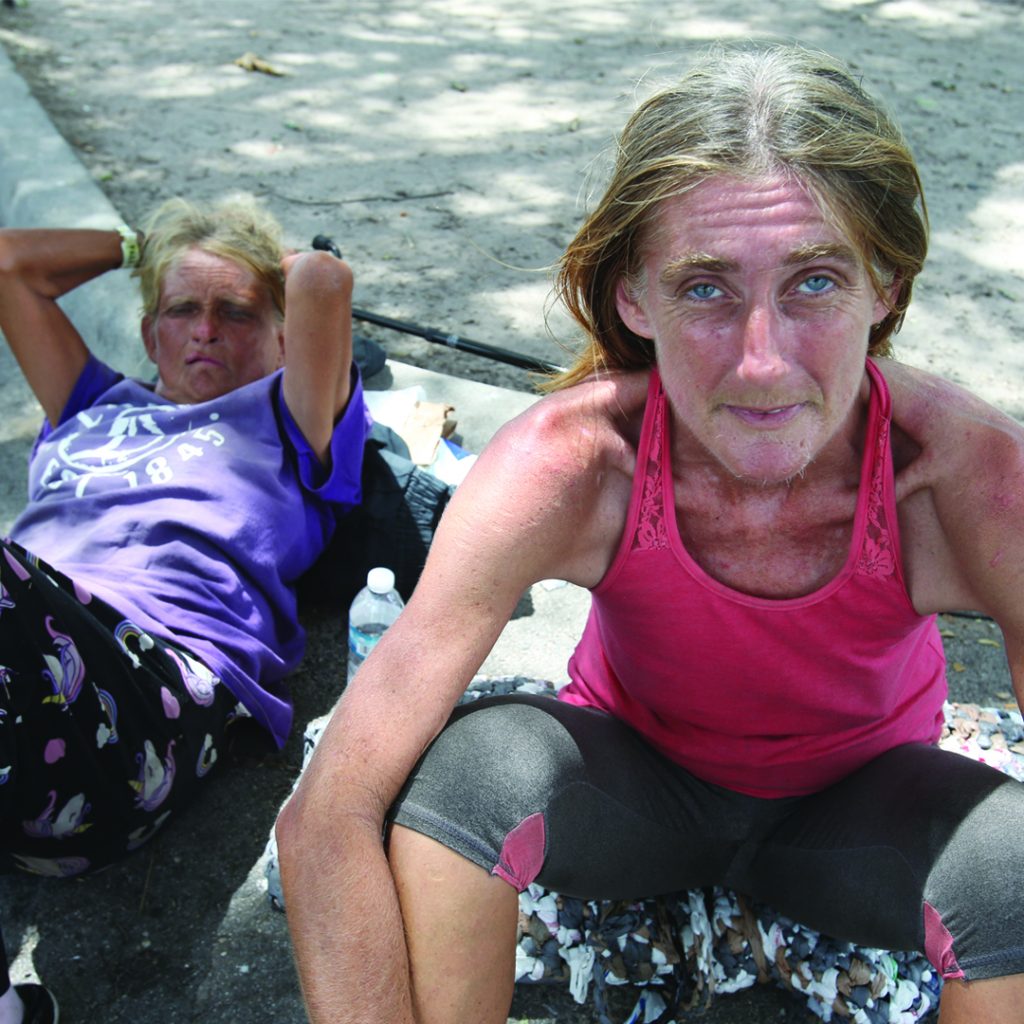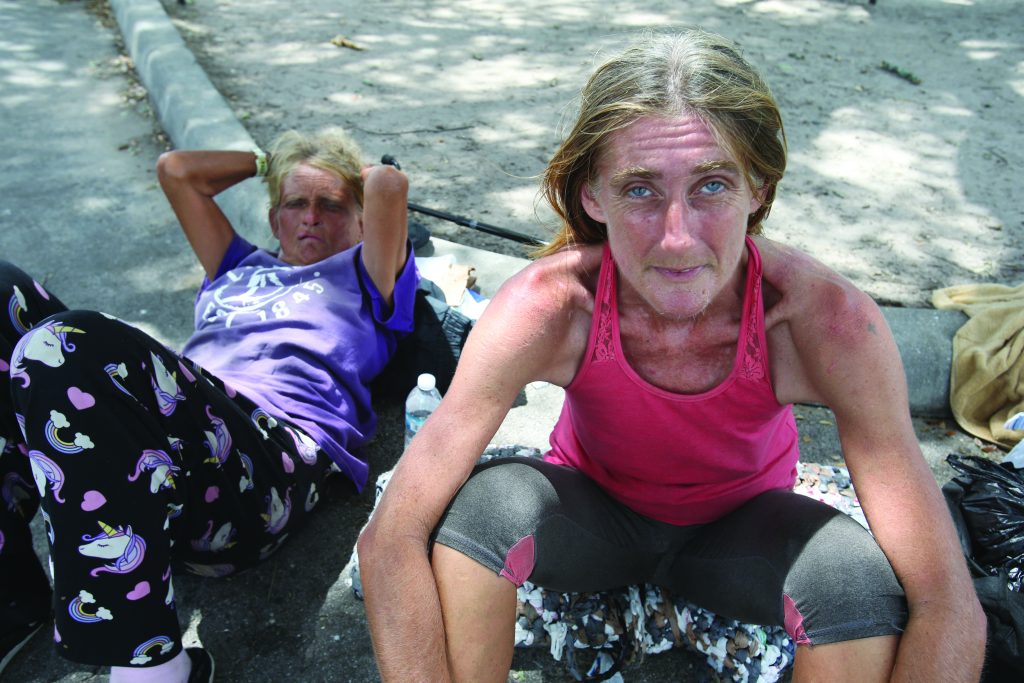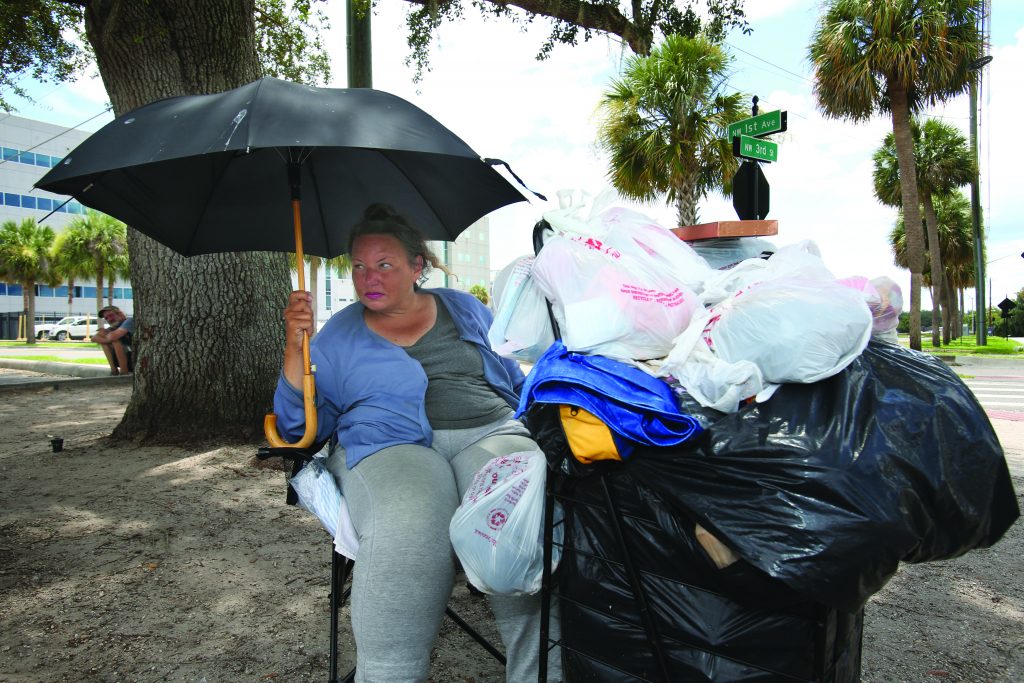Moving homeless, and trying to help them, too

Deborah Slaton, right, a homeless woman and a woman who only wanted to be identified as Carol, left, who is also homeless, rest together in a parking lot near the intersection of Northwest First Avenue and Northwest Third Street in Ocala, Fla. on Monday, July 20, 2020. The homeless people who stay and live in the parking lot have become a familiar sight recently in downtown Ocala. Many of the homeless say that drug dealers come and drive up to deal in the parking lot and that the Ocala Police Department ignores the problem. [Bruce Ackerman/Ocala Gazette] 2020.

Deborah Slaton, right, a homeless woman and a woman who only wanted to be identified as Carol, left, who is also homeless, rest together in a parking lot near the intersection of Northwest First Avenue and Northwest Third Street in Ocala, Fla. on Monday, July 20, 2020. The homeless people who stay and live in the parking lot have become a familiar sight recently in downtown Ocala. Many of the homeless say that drug dealers come and drive up to deal in the parking lot and that the Ocala Police Department ignores the problem. [Bruce Ackerman/Ocala Gazette] 2020.
The city-owned parking lot at Northwest First Avenue and Third Street in downtown Ocala had become a 24/7 gathering spot for dozens of homeless residents over the past year or so, drawing complaints from neighborhood businesses and promises of action from politicians who have been hearing such grumbling for years.
Then suddenly this week, the parking lot where the homeless had lived and slept for months were gone. Ocala Mayor Kent Guinn said the city, after weeks of warnings, threatened to issue trespass citations, which would have meant jail for many of the homeless people. So, the homeless left.
The homeless issue has been dogging downtown Ocala for a generation. New City Manager Sandra Wilson said addressing homelessness once and for all is one of her priorities. She said plans to redevelop the so-called “midtown,” the part of downtown Ocala located north of Silver Springs Boulevard and another city priority, is in question until there is progress in permanently removing the large numbers of homeless people from the center city.
“That’s huge for us,” Wilson said of homelessness in the downtown. “It’s really impacting the quality of life of our midtown businesses. It’s sad, but it’s a complex issue.”
Acknowledging that the issue is not new and that solutions are complicated and expensive, Wilson said she is looking for input from the community.

“Joanna,” a homeless woman, keeps all of her belongings next to her in a cart as she sits under her umbrella in a parking lot near the intersection of Northwest First Avenue and Northwest Third Street in Ocala, Fla. on Monday, July 20, 2020. The homeless people who stay and live in the parking lot have become a familiar sight recently in downtown Ocala. Many of the homeless say that drug dealers come and drive up to deal in the parking lot and that the Ocala Police Department ignores the problem. [Bruce Ackerman/Ocala Gazette] 2020.
“I’m looking for ideas from anyone,” she said.
Of course, there are no shortage of ideas. A 2019 Marion County Public Policy Institute study that was months in the making said seriously addressing the issue calls for three things: a plan, a funding source and leadership. Once those are in place, there needs to be aggressive face-to-face outreach with the homeless to get them what they need to restore their lives to normality, said Scot Quintel, the executive director of the United Way of Marion County who chaired the PPI study, titled “Homelessness: The Long Way Home.”
“You’ve got to interact with the homeless people to find out what services they need and how to get them to them,” he said.
Quintel said one of the greatest needs in Ocala is “permanent supportive housing.” Permanent supportive housing is accessible, affordable housing for the homeless with regular support and interaction from social services agencies for everything from ensuring medications are taken on schedule to assistance in finding a job to getting regular mental health or drug treatment.
Permanent supportive housing not only gets people off the streets, Quintel noted, but also makes the recovering homeless accountable. While such a program comes with a cost, Quintel believes the investment will be more than offset by the results.
“As a community, even if there’ a cost of doing that, if we get them off the street, what we save in law enforcement and criminal justice costs, health care costs, well, the savings will more than offset the costs,” he said.
Part of what the PPI study recommended was a change in how local homeless strategy and services are coordinated – and funded. The result was the creation of the city-county Joint Office of Homeless Prevention & Intervention, which has a newly hired director in Lisa Rice.
Quintel said when outside analysts examined Ocala’s resources for assisting the homeless during the 2019 study, they homed in on Ocala’s permanent supportive housing inventory. What they found was alarming, he said. They identified about a dozen such units in the community. They said there needs to be about 200 units to realistically serve the need.
Guinn said he wants to hold a discussion about ways to fund homeless initiatives. In Miami, where they have developed an extensive and successful homeless assistance program, they have a tax on food and beverage that produces millions annually. The mayor said he would be willing to explore such a tax here.
The city’s social services liaison, Robin Ford, who interacts and helps the homeless on a daily basis, said that any concerted effort to reduce homelessness must include effective mental health and drug treatment programs.
“The biggest issues I see are mental health, substance abuse and the lack of permanent supportive housing,” Ford said.
Quintel said he is optimistic because the creation of the Joint Office of Homeless Prevention & Intervention will have the help of a new funding oversight board, which was another outcome of the PPI study. Each community has what is called a Continuum of Care, the vehicle through which state and federal dollars are funneled to homeless programs. Ocala/Marion County’s used to be overseen by the Marion County Homeless Council, which struggled in that role. Under the new arrangement, the Joint Office will coordinate the Continuum of Care.





